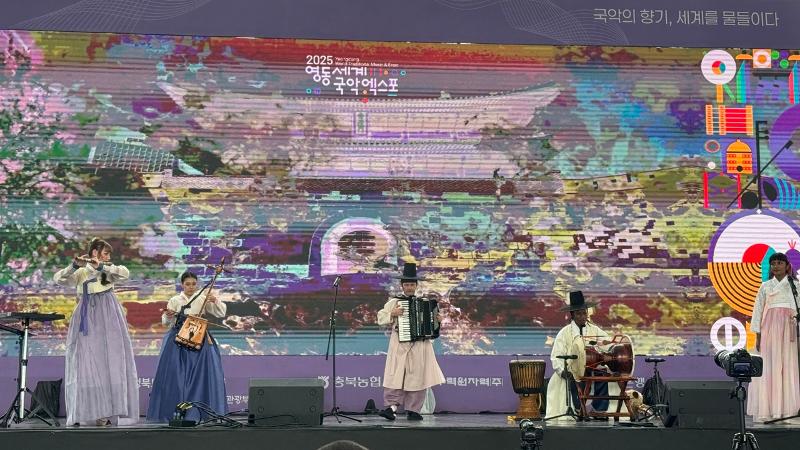
Sound Trek, a gugak (traditional music) band composed of five foreign members, on Sept. 18 performs at the Yeongdong World Traditional Music and Arts Expo in Yeongdong-gun County, Chungcheongbuk-do Province. (Korea International Broadcasting Foundation)
By Kim Seon Ah
The Yeongdong World Traditional Music and Arts Expo held on Sept. 18 in Yeongdong-gun County, Chungcheongbuk-do Province, featured foreign musicians wearing Hanbok (traditional clothing) comprising a white dopo (traditional overcoat), gat (traditional hat), lavender skirt and beige jeogori (traditional jacket) perform on stage.
The group used the daegeum (large bamboo flute), haegeum (traditional two-string fiddle) and accordion to play a familiar melody. The audience briefly held their breath but shook their bodies according to the lively rhythm and cheered as the music transcended national borders and captivated everyone's hearts.
The act on stage was Sound Trek, a gugak (traditional music) band composed of five members from Germany, Russia, Mexico, Mongolia and Burkina Faso. The Ministry of Culture, Sports and Tourism and the Korea International Broadcasting Foundation jointly organized the group to globally promote Korea's traditional music.
The members were selected through an audition in April and received five months of training from the nation's top gugak musicians such as vocalist Kwon Song-hee, percussionist Jang Jae-hyo and daegeum maestro Baek Da-som.
Sound Trek performed sinawi, or ensemble music derived from shamanistic rituals, "Sarangga" (Love Song), Bukcheong lion dance and an "Arirang" medley.
German member Madlen Poguntke played the flute and daegeum in reinterpreting the songs, while Sheykin Alexander from Russia added a unique touch to gugak rhythms with his accordion.
Nancy Castro from Mexico, famous in Korea as a student of Gyeonggi minyo (folk songs), added depth with her voice, while Khulan Erdenemunkh from Mongolia expanded gugak's range with the traditional Mongolian fiddle morin khuur. Diabate Amidou from Burkina Faso played the janggu (traditional drum).
The audience response was that "Arirang" played by foreign musicians was more moving.
Chae Su-hee, director general of the ministry's Global Public Relations Bureau, smiled while watching the performance. "It's very meaningful to promote our culture through various methods," she said. "I thought this experience was even more rewarding when Sound Trek on stage called this 'a journey for them to better understand and promote Korean culture.'"
The ministry and Arirang TV jointly made a five-episode documentary on the launch and activities of Sound Trek. Slated for global release late this month, the series shows the band's audition, training and first performance.
sofiakim218@korea.kr